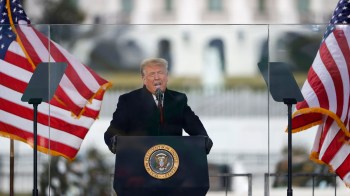Geithner’s new TARP rules murky
TEXT OF STORY
KAI RYSSDAL: President Obama went up to Capitol Hill today to have a chat with the loyal opposition. He met with Republican members of both chambers to talk stimulus. As you might expect, he asked that they put political differences aside when the $825 billion package comes up for a vote tomorrow in the House.
Fresh off his swearing in last night, the new Treasury Secretary Timothy Geithner jumped right into things. Geithner announced new rules today on how government bailout money’s going to be handed out. This is the $350 billion the Obama administration has left from the original TARP.
The rules are designed to limit lobbying by companies that want to get their hands on some of the cash. They’re still pretty vague. And they don’t apply to the lobbying that goes on, on Capitol Hill.
Marketplace’s Nancy Marshall Genzer explains.
NANCY MARSHALL GENZER: The Treasury Department’s press release trumpets “a new level of openness and accountability.” But Treasury won’t comment beyond that. Which leaves a big question unanswered: What to do about banks that lobby lawmakers? Treasury decides who gets the bailout money. But already some banks have won big chunks of cash, after their representatives put in a good word. How difficult will it be to control that?
Mary Boyle is with Common Cause:
MARY BOYLE: It’s going to be very difficult. You know, that’s among the many million-dollar questions here.
Massie Ritsch thinks he knows the answer. He’s with the Center for Responsive Politics. He says Treasury won’t be able to ignore those phone calls from Congress, especially since the Obama administration may be asking lawmakers for more money to shore up the financial system.
MASSIE RITSCH: If there are two banks, and one is in the district of a lawmaker on a financial committee, then they’re probably going to side with the bank in the district of the person who will control whether there’s additional money available.
Still, both Ritsch and Boyle say Treasury is making a good-faith effort.
Bill Isaac isn’t so sure. He’s a former FDIC chairman. He says Treasury’s new rules are vague for a reason.
BILL ISSAC: Usually when things are vague it’s because nobody wants them to really bite.
Isaac says Treasury is a political animal itself and can’t escape lobbyists’ influence. He says a more independent agency, like the FDIC or the Fed, should be in charge of the bailout cash. The chances of that?
ISSAC: Somewhere between slim and none.
In Washington, I’m Nancy Marshall Genzer for Marketplace.
There’s a lot happening in the world. Through it all, Marketplace is here for you.
You rely on Marketplace to break down the world’s events and tell you how it affects you in a fact-based, approachable way. We rely on your financial support to keep making that possible.
Your donation today powers the independent journalism that you rely on. For just $5/month, you can help sustain Marketplace so we can keep reporting on the things that matter to you.


















